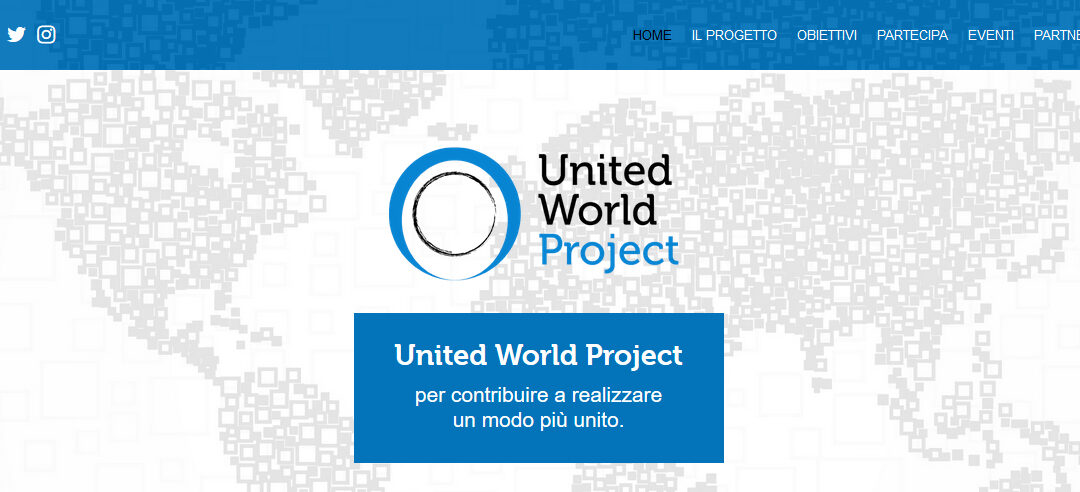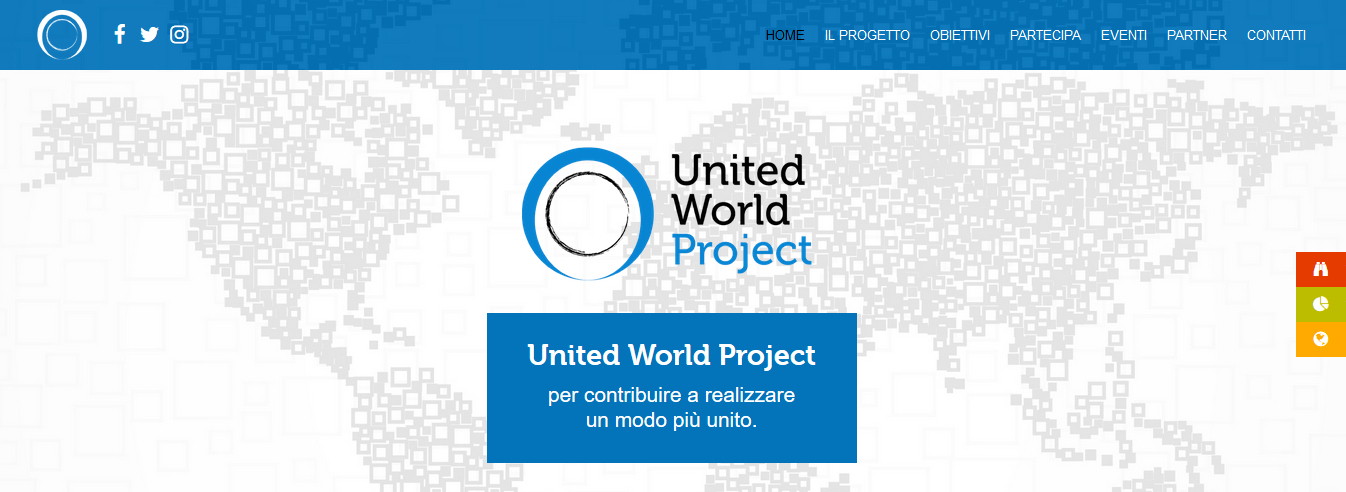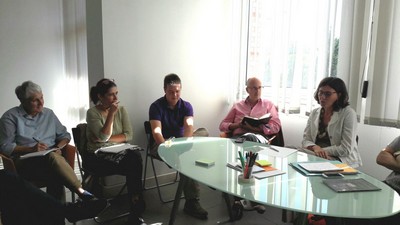
Jul 31, 2018 | Non categorizzato
 “We live in a world which has become a real village: complex and new, but a village. Humanity today lives as if it were a small group. And if it is so, it could really live, in brotherhood. But how can we make it bloom?” Chiara Lubich See the new website: www.unitedworldproject.org With new contents: Watch, Workshop, Network «UWP, promoted by New Humanity, wishes to contribute to the creation of the united world by mapping, promoting and setting on the network the personal and collective good practices, processes, big or small actions, daily or extraordinary ones that contribute to make the world a place o peace, more fraternal and united” as listed in its objectives. Enter into the United World Project network!
“We live in a world which has become a real village: complex and new, but a village. Humanity today lives as if it were a small group. And if it is so, it could really live, in brotherhood. But how can we make it bloom?” Chiara Lubich See the new website: www.unitedworldproject.org With new contents: Watch, Workshop, Network «UWP, promoted by New Humanity, wishes to contribute to the creation of the united world by mapping, promoting and setting on the network the personal and collective good practices, processes, big or small actions, daily or extraordinary ones that contribute to make the world a place o peace, more fraternal and united” as listed in its objectives. Enter into the United World Project network!
Jul 29, 2018 | Non categorizzato
More than 50 countries have signed up to the International Day of Friendship, which the United Nations established in 2011 and is celebrated each year on July 30. (Some countries, such as India, Nepal and Bangladesh, celebrate it in the days just following.) The aim of the day is to encourage governments, associations and groups to promote every kind of friendship, solidarity, trust, mutual understanding and forgiveness. This is in line with local cultures and customs, with the conviction that these feelings can effectively contribute to peace between peoples and nations. The UN especially encourages young people, as future leaders, to undertake community activities that include different cultures, to promote international understanding and respect for diversity. Judging by the thousands of young people who enthusiastically took to the message of friendship and unity “Beyond all borders,” at the recent Genfest in Manila and many other countries, the encouragement has not fallen on deaf ears.
Jul 28, 2018 | Non categorizzato, Word of
The prophet Jeremiah was sent by God to the people of Israel, who were experiencing the pain of exile in Babylon. They had lost everything that represented their identity and chosenness: their land, the temple and the law… However, the prophet’s words pierce through this sense of pain and loss. It is true that Israel had been unfaithful to the covenant of love with God and this had led to destruction. But then came the proclamation of a new promise of freedom, salvation, and a renewed covenant. God was preparing this out of his eternal and unfailing love for his people. “I have loved you with an everlasting love; therefore I have continued my faithfulness to you.” “The eternal and unfailing nature of God’s faithfulness is a quality of His love. He is the Father of every human being, a Father who is the first to love; and his commitment is forever. His faithfulness touches each one of us and allows us to entrust to Him every worry that might block us. This eternal and patient love also helps us grow and improve our relationship with Him and with others. We are well aware that our commitment to love God and our neighbours is not yet constant, although it is sincere. But His faithfulness to us is freely given, anticipating our needs, regardless of the ‘service’ we give. With this joyful assurance, we can go beyond our limited view of things and start out on the journey again each day, becoming witnesses to this “motherly” love. “I have loved you with an everlasting love; therefore I have continued my faithfulness to you.” God’s loving way of looking at humanity also reveals a wonderful plan to make all people become one family, which reaches its fulfilment in Jesus. In fact, he bore witness to his trust in God’s love through his word, and above all, with the example of his life. He made it possible for us to imitate the Father’s love for all (Mt 5:43 ff.). He showed us that the vocation of every man and woman is to contribute personally to building relationships of acceptance and dialogue. How can we live the Word of life for this month? Chiara Lubich invites us to have a mother’s heart: « […] A mother always welcomes, always helps, always hopes, and covers everything. […] In fact, the love of a mother is very similar to the love of Christ which St Paul spoke of. If we have a mother’s heart, or, more precisely, if we decide to have Mary’s heart, the heart of the Mother par excellence, we will always be ready to love others in all circumstances and to keep the Risen Lord alive in us. […] If we have the heart of this Mother, we will love everyone and not only the members of our own church, but also other people’s churches. Not only Christians, but also Muslims, Buddhists, Hindus, and so on. We will love all people of good will and every person who lives on this earth […] » . “I have loved you with an everlasting love; therefore I have continued my faithfulness to you.” A young wife, who started living the Gospel in her family said: “I experienced a joy I never had before and wanted to share this love outside the four walls of our house. For example, I remember running to the hospital to visit the wife of a colleague who had attempted suicide. For quite a time, I had known of their difficulties, but being absorbed in my own problems, I had not bothered to help her. But then I felt her suffering was my own and I could not rest until the situation that had driven her to that point was resolved. This experience marked the beginning of a change in my mentality. I understood that, if I love, I can be a reflection of God’s love for everyone I meet, even if only a very small one “. What if we too, sustained by God’s faithful love, freely have this inner attitude in the presence of everyone we meet during the day? Letizia Magri
Jul 27, 2018 | Non categorizzato
“The woman of Nazareth, as a homemaker, offers an enormous challenge for us, urging us to set aside a spirituality based on a fascination for the extraordinary in order to find mysticism in our daily routines. From theoretical fantasies to a tangible reality in the simplicity of the everyday… that is where God walks. Ermes Ronchi, Le domande nude del Vangelo (The bare questions of the Gospel), p. 176. “We truly need a home. A home is extremely important… It needs to be kept as most holy Mary kept hers, which hosted no less than Jesus, so she needed to do something in harmony with he who was the Word of God. “It was the beauty of God, it was brilliant, it was glorious, for glory means God’s brilliance. I don’t know if you can imagine, as a way of saying, God as a sun that is setting. Its rays that shine forth are the Word. The Word of God that became flesh is Jesus. So he is truly the glory, the height of beauty, splendor. “And so Mary… in her home… she knew how to keep it well, in a way that hosted Jesus well… Our calling, if it is a Marian calling, is making a home. You can’t understand Mary if you don’t understand a mother at home, beyond being the seat of wisdom, someone who knew how to keep a home.” Chiara Lubich on May 30, 1996, at the inauguration of the Gen house in Loppiano, Italy “A mother is more about intuitions of the heart than speculations of the intellect, more poetry than philosophy. She is quite magnificent and grounded, close to the human heart. “Thus it is so with Mary, mother of mothers, who is the sum of all affection, goodness and mercy, to which all the world’s mothers cannot compare. Mary is peaceful like nature, pure, serene, clear, moderate, beautiful… She is gifted, spirited, tidy, steadfast, rich with hope. “She is too close to us and unpretentious to be contemplated… She brings the divine to earth, like a heavenly plane that gently slopes from a dizzying height of the heavens down to the infinite smallness of creatures.” Chiara Lubich, Disegni di luce (Designs of light), p. 84–85.
Jul 26, 2018 | Non categorizzato
“Fifty years after being published, Paul VI’s encyclical Humanae vitae appears entirely different to modern eyes. In 1968 it was a brave document – and as a result controversial– that went against the climate of the time. This was the era of the sexual revolution, which needed certainty of contraception and the possibility of abortion in order to happen. It was also a time when economists spoke of a ‘human bomb’ – the danger of overpopulation that threatened rich countries, which could have decreased their prosperity.” So writes Lucetta Scaraffia in Avvenire, although she concludes that today the world has changed and that the encyclical should be read again with a different perspective: as a “prophetic event.” It was published on July 25, 1968, in the sixth year of Paul VI’s pontificate, and caused a number of conflicting responses.

Jul 24, 2018 | Non categorizzato
Well aware of the environmental and social crises that our planet faces, hundreds of people around the world have been steadily moving to find creative solutions to these grave problems, putting them in motion in their everyday lives through actions large and small. However, these actions often begin, grow and die totally in isolation. “Together we can do much more” is one of the mottos proposed by Prophetic Economy, a project that aims to create collaborative networks among all those who, in their own context, work to promote human development, independent of age, nationality or beliefs. The main event for Prophetic Economy will land at Castel Gandolfo in Rome from November 2–4. Experts from many fields will be involved, such as Jeffrey Sachs, North American economist and one of the world’s top minds when it comes to economic and sustainability questions; or Luigino Bruni, Italian economist and international coordinator of the Economy of Communion. “The experience is open to all people, organizations and businesses,” says Florencia Locascio, Prophetic Economy’s general coordinator. “All those who propose sustainable and creative solutions to the problem of poverty, inequality and the social and environmental crises that we are living through. We want to identify the changemakers, the innovators, and give them more visibility.”  During the event, in addition to workshops, collective activities, networking and panels with renowned international experts, the first-ever Prophetic Practices Award 2018 will be awarded. The competition awards, spotlights and connects existing experiences of a prophetic economy, the many best practices that are already up and running that contribute to the common good. “Teens and the new generations have something important to say, and they already contribute enthusiastically, offering practical examples that are exciting,” explains Paolo Matterazzo, who directs communications for the Community of Nomadelfia. The first three to win the competition will receive a monetary prize and be invited to present their projects during the November event. The top ten will also have the chance to present their best practices. Deadline for the competition is August 1. For more information, see propheticeconomy.org. Source: United World Project
During the event, in addition to workshops, collective activities, networking and panels with renowned international experts, the first-ever Prophetic Practices Award 2018 will be awarded. The competition awards, spotlights and connects existing experiences of a prophetic economy, the many best practices that are already up and running that contribute to the common good. “Teens and the new generations have something important to say, and they already contribute enthusiastically, offering practical examples that are exciting,” explains Paolo Matterazzo, who directs communications for the Community of Nomadelfia. The first three to win the competition will receive a monetary prize and be invited to present their projects during the November event. The top ten will also have the chance to present their best practices. Deadline for the competition is August 1. For more information, see propheticeconomy.org. Source: United World Project

 “We live in a world which has become a real village: complex and new, but a village. Humanity today lives as if it were a small group. And if it is so, it could really live, in brotherhood. But how can we make it bloom?” Chiara Lubich See the new website: www.unitedworldproject.org With new contents: Watch, Workshop, Network «UWP, promoted by New Humanity, wishes to contribute to the creation of the united world by mapping, promoting and setting on the network the personal and collective good practices, processes, big or small actions, daily or extraordinary ones that contribute to make the world a place o peace, more fraternal and united” as listed in its objectives. Enter into the United World Project network!
“We live in a world which has become a real village: complex and new, but a village. Humanity today lives as if it were a small group. And if it is so, it could really live, in brotherhood. But how can we make it bloom?” Chiara Lubich See the new website: www.unitedworldproject.org With new contents: Watch, Workshop, Network «UWP, promoted by New Humanity, wishes to contribute to the creation of the united world by mapping, promoting and setting on the network the personal and collective good practices, processes, big or small actions, daily or extraordinary ones that contribute to make the world a place o peace, more fraternal and united” as listed in its objectives. Enter into the United World Project network!
